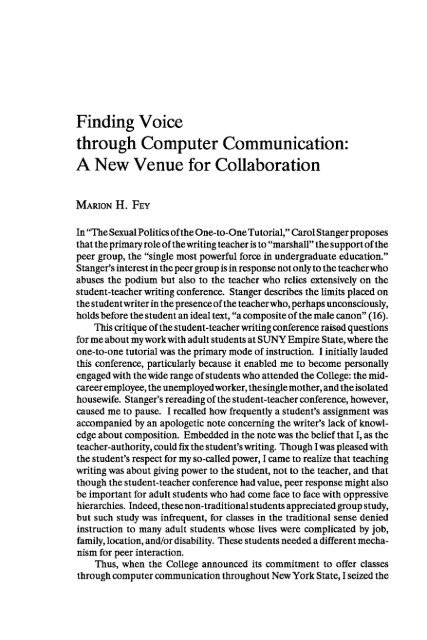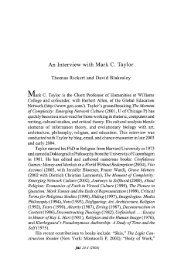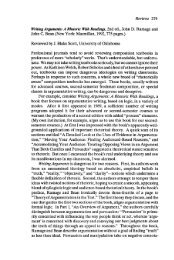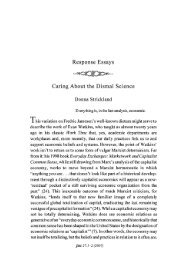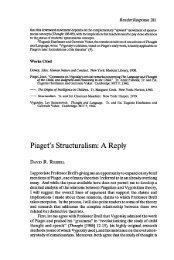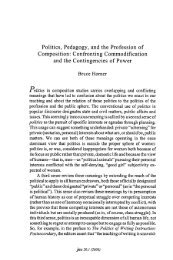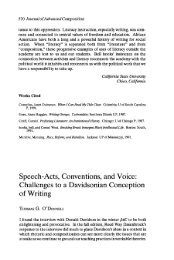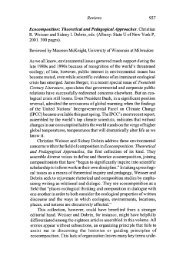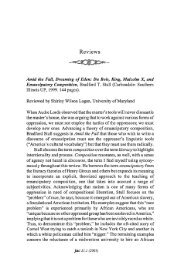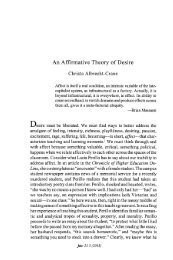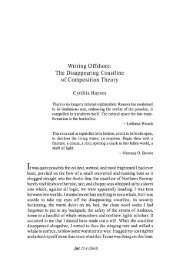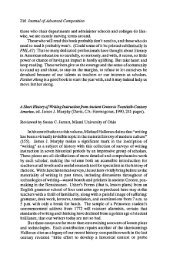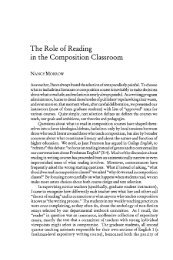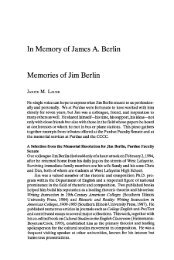Finding Voice through Computer Communication: A ... - JAC Online
Finding Voice through Computer Communication: A ... - JAC Online
Finding Voice through Computer Communication: A ... - JAC Online
Create successful ePaper yourself
Turn your PDF publications into a flip-book with our unique Google optimized e-Paper software.
<strong>Finding</strong> <strong>Voice</strong><br />
<strong>through</strong> <strong>Computer</strong> <strong>Communication</strong>:<br />
A New Venue for Collaboration<br />
MARION H. FEY<br />
In "The Sexual Politics ofthe One-to-One Tutorial," Carol Stanger proposes<br />
that the primary role of the writing teacher isto "marshall" the support of the<br />
peer group, the "single most powerful force in undergraduate education."<br />
Stanger's interest in the peer group isin response not only to the teacher who<br />
abuses the podium but also to the teacher who relies extensively on the<br />
student-teacher writing conference. Stanger describes the limits placed on<br />
the studentwriter in the presence of the teacher who, perhaps unconsciously,<br />
holds before the student an ideal text, "a composite of the male canon" (16).<br />
This critique of the student-teacher writing conference raised questions<br />
for me about mywork with adult students at SUNY Empire State, where the<br />
one-to-one tutorial was the primary mode of instruction. I initially lauded<br />
this conference, particularly because it enabled me to become personally<br />
engaged with the wide range of students who attended the College: the midcareer<br />
employee, the unemployed worker, the single mother, and the isolated<br />
housewife. Stanger's rereading of the student-teacher conference, however,<br />
caused me to pause. I recalled how frequently a student's assignment was<br />
accompanied by an apologetic note concerning the writer's lack of knowledge<br />
about composition. Embedded in the note was the belief that I, as the<br />
teacher-authority, could fixthe student's writing. Though Iwas pleased with<br />
the student's respect for my so-called power, I came to realize that teaching<br />
writing was about giving power to the student, not to the teacher, and that<br />
though the student-teacher conference had value, peer response might also<br />
be important for adult students who had come face to face with oppressive<br />
hierarchies. Indeed, these non-traditional students appreciated group study,<br />
but such study was infrequent, for classes in the traditional sense denied<br />
instruction to many adult students whose lives were complicated by job,<br />
family, location, and/or disability. These students needed a different mechanism<br />
for peer interaction.<br />
Thus, when the College announced its commitment to offer classes<br />
<strong>through</strong> computer communication <strong>through</strong>out New York State, I seized the
222 JournalofAdvancedComposition<br />
opportunity to explore the new venue of collaboration with students in<br />
composition. My own experience in recent graduate study-study that I had<br />
postponed because of my own family and work responsibilities-also propelled<br />
me to investigate a medium for peer collaboration. Like mystudents,<br />
I understood the satisfaction that came from achieving a goal delayed by life<br />
circumstances. Furthermore, in my graduate study I had felt an emerging<br />
confidence as I participated for the first time in collaborative writing groups<br />
that encouraged students to value the writing of peers and to integrate life<br />
experiences into reflective efforts. Through this study I became sensitive to<br />
the limitations of impersonal, hierarchical, traditional education, most<br />
particularly to its limitations of women's voices. I related to the dilemma of<br />
Goulston's university education in which she transferred her "private domestic<br />
skillsquite effectivelyto the classroom" in order to please her "mostly<br />
male professors" by "grasping and admiring their ideas." Though she<br />
excelled in the written contest, she, like uncounted women before her, denied<br />
the development of her own selfand voice, continuing to think that everyone<br />
knew more than she did (20). After experiencing the benefits of more<br />
ameliorative educational structures, I was even more motivated to find a<br />
solution to my students' isolation.<br />
Thus, I turned to the computer as a completely new venue for the<br />
teaching of writing. This technology would enable students to share their<br />
writing and thoughts with peers, despite their irregular schedules and distant<br />
locations, for, by its very arrangement, it offered a new organization for<br />
learning. I proceeded blithely, undaunted by Selfe and Wahlstrom's prediction<br />
that when "technologies join groups of people together, they do so in a<br />
way that ... modifies, in a waywe simply could not consider beforehand, the<br />
nature of human interaction and the ways humans construct and contend<br />
with their world" (294). These promises led me to investigate the contributions<br />
of the computer to writing study, to determine whether its unique type<br />
of collaboration might redefine the writing classroom with more horizontal,<br />
open structures of communication enabling adult students to learn from<br />
others as they developed their writing style and their own voices.<br />
The computer system permitted me, as well as students, to log on<br />
<strong>through</strong> modem connections to the College's mainframe computer from<br />
office or home computer at any time of day or night. With asynchronous<br />
connection, students and I used the computer not as an ancillary support to<br />
classroom instruction, but as the primary mode of learning. With a topical<br />
organization, the conference program Caucus provided a transcript of all<br />
transactions including large- and small-group interactions. The Caucus<br />
program was set so that all participants had access to transactions of the<br />
permanent small-groups, even though members of those groups were the<br />
primary respondents. In addition, students had accessto electronic mail (Email)<br />
for private student-teacher conferences. Even with the caring environment<br />
that emerged <strong>through</strong> Caucus, students needed the home base of E-
<strong>Finding</strong><strong>Voice</strong> 223<br />
mail for additional direction, instruction, nurturing, and even friendship,<br />
particularly students like Kathleen, who later declared that E-mail was "the<br />
greatest thing since sliced bread." Excited by the computer's flexibilitythat<br />
would accommodate the constraints of adult students' complex life circumstances,<br />
I turned to the design of the composition curriculum.<br />
The Curriculum for Collaboration<br />
The curriculum focused on the familiar cultural institutions of family,<br />
education, and workplace. I asked students to respond to professional<br />
readings <strong>through</strong> a large-group "discussion" and to prepare a response<br />
writing based on these readings for small-group peer review. Among the<br />
readings were Walker's "In Search of Our Mothers' Gardens," Glaspell's<br />
"Trifles," Rodriguez's "The Achievement of Desire," Rich's "When We<br />
Dead Awaken: Writing as Re-Vision," and David Noble's "Automation<br />
Madness." The large-group discussions and individual response writings<br />
were stimulated bythe general questions I proposed that prompted students<br />
to examine their own experience in relation to the readings. Such public<br />
reflection seemed particularly important for adult students who had been<br />
denied reflective dialogue because of the business of daily living and the<br />
isolation of life circumstances. Building upon their response writings,<br />
students wrote three compositions relating to the cultural institutions under<br />
study. As with all other communications, these compositions were transmitted<br />
<strong>through</strong> the computer network. I entitled the course Writing for the 21st<br />
Century, not onlybecause of its frontier medium, but also because of its focus<br />
on the development of voice of all participants no matter how diverse or<br />
different they were in the panoply of our multicultural world.<br />
In shaping the course, I was guided by many feminist voices. For<br />
example, following Schuster and Van Dyne's "woman-focused classroom,"<br />
students were encouraged to uncover gender biases relating to authority<br />
roles masked in social institutions; to assume authority by giving approval<br />
and validation to their peers; to value experience by understanding its<br />
sources; and to work together in a caring community (168-69). I extended<br />
these basic principles to include Schuster and Van Dyne's sixth stage of<br />
curriculum change: namely, a "transformed, balanced curriculum" that<br />
raises questions about gender issues of women and men and reflects how<br />
these issues intersect with class and race (16).<br />
I was also guided by collaborative composition theory, particularly the<br />
composition models of Kenneth Bruffeeand David Bleich. For Bruffee, "the<br />
matrix of thought is not the individual self but some community of knowledgeable<br />
peers and the vernacular language of that community" (777).<br />
Through collaboration with peers, students construct knowledge together as<br />
they become familiar with the discourse community of the academy. While<br />
Bruffee relies on collaboration to aid his students in learning the language<br />
and forms of the academy, Bleich introduces collaboration to examine
224 Journal of Advanced Composition<br />
language and experience of students outside of the classroom. Advocating<br />
the use of the classroom "to create freedoms outside school and to reduce the<br />
adversary character of otherness" ("Book Review" 45-49), Bleich urges<br />
teachers "to abandon the idea of literacyasa trainable skilland ... to establish<br />
the principle that attention to literacy in any of its aspects entails simultaneous<br />
attention to the community, the culture, and the process of language<br />
socialization" ("Reconceiving Literacy" 25). Bleich's collaborative model<br />
recognizes differences such as gender, race, and class; seeks authority for<br />
each member; and works toward change as students begin to understand the<br />
social relations embedded in their language experiences. Though Bruffee's<br />
social construction afknowledge undergirded Writing for the 21st Century<br />
and his focus on the craft of academic prose was apparent, Bleich's collaborative<br />
model with its emphasis on social relations was primary in informing<br />
the subject matter for the course. Consequently, the course asked students<br />
to examine social issues in a collaborative context, with the aim of empowering<br />
each individual to use his or her own language confidently and sensitively.<br />
Connecting <strong>through</strong> <strong>Computer</strong> <strong>Communication</strong><br />
In most cases, students and I met for the first time <strong>through</strong> computer<br />
communication. Eight adult students enrolled in the first composition<br />
course, and thirteen students enrolled in the course that followed, in all<br />
thirteen women and eight men. From their initial messages and .later<br />
collaboration, I learned that jobs meant bread and butter for these adults.<br />
Five students worked at large industrial companies in accounting, systems<br />
analysis, and computer programming. Several students worked for smaller<br />
businesses as service engineers and secretaries. Three held civilservice jobs<br />
as librarian, social service counselor, and traffic engineer. Also represented<br />
were two factory workers, a proud community-college professor in heating<br />
and air-conditioning technology, a part-time bank cleaner, a part-time<br />
private accountant, a telecommunications employee for a company in California,<br />
and a woman who owned and operated a farm with her husband and<br />
supplemented that business with secretarial work. All students lived within<br />
eighty miles of SUNY Empire State's Rochester location. Only one student,<br />
Maggie, depended on the College's computer and modem. The ages of the<br />
students ranged from twenty-sixto fifty. Their outside interests varied from<br />
studying the Tarot and writing novels to participating in church activities.<br />
Most students had put these aside, however, in order to work toward college<br />
degrees that would enable them, as Gary put it, "to stop pulling wrenches."!<br />
The prior education of students was as diverse as their occupations.<br />
Renee stopped school in the ninth grade, later receiving her GED and<br />
attending community college. Charlie, defying his school-librarian mother<br />
and "dictionary toting, professional journalist father," confided, "I dropped<br />
out of school the day I turned sixteen to become a good-for-nothing-hippiebum-musician."<br />
Patti had attended a well-known college in the Northeast
<strong>Finding</strong><strong>Voice</strong> 225<br />
but had returned to the area when her mother died. The disparity in the<br />
education of students' parents was similar. In an interview, Clint shyly<br />
revealed that his mother completed onlysixthgrade,while Patti and Kathleen<br />
reported their fathers had taught part time in local colleges.<br />
Early on, students connected <strong>through</strong> their writings about life experiences,<br />
tributes to personal heroes, and cultural perspectives. After reading<br />
Walker's essay, each of us listened with empathy to Maggie's tribute to her<br />
own mother:<br />
Even with the odds of being a Black woman in the South in the early sixties, my mother<br />
managed to raise five children, the remainder of the original fifteen, plus three grandchildren<br />
alone [that is, with her husband, she raised ten children, and, on her own, five, in<br />
addition to three grandchildren] ....<br />
Although we did not have the extra things we wanted, we still had most of what we<br />
needed and also a sense of pride and dignity. She instilled in us a sense of self worth and<br />
endurance. Although during that time it was common for a Black child io bedegraded<br />
and scorned, I always felt as though I was as good or better than the next person.<br />
My mother died with more than enough earthly property to suffice, but in the eyes<br />
of our society, she was just a poor woman who, because she hadn't an over abundance<br />
of money or was not recognized by anyone of position, was not considered a hero. She<br />
was my hero although I realized that a little late in life. Black women have always been<br />
expected to shoulder the burden of housekeeping, child rearing and anything else that<br />
went along with keeping a home a satisfied one.<br />
Not only was she expected to make her own home happy but oft' times she was a hired<br />
hand in this trade. She showed me an inner strength <strong>through</strong> all of the trials in the life<br />
of a Black woman, equaled only by her inner peace.<br />
Maggie's experience mirrored the ways in which race, class, and gender<br />
intersected in her own life. That Maggie could name this experience in the<br />
presence of peers contributed to her own sense of authority.<br />
Students reflected upon cultural issues both in their permanent small<br />
groups and in the large group where the entire class engaged in discussion.<br />
Their writings and "conversations" supported Freire's contention that a<br />
word when uttered in the context of reflection and action has the power to<br />
"transform reality" (75). More similar to talk than the traditional academic<br />
essay,this written computer communication also illustrated Donald Rubin's<br />
belief that talk "at its heart" is "an exuberant affirmation of self ...<br />
affirmation of our own fundamental human identity" (1).<br />
The words that crossed the screen each day lured me more deeply and<br />
personally into students' livesthan in any traditional college classroom I had<br />
known. Connections grew as gender and authority issues loomed in the<br />
discussion of Walker's work. Though Clint had named his mother a hero for<br />
opening their home to thirty foster children and for helping him deal with the<br />
"unbending German attitude" of his father, he was not so generous in his<br />
"reading" of the whole of Walker's essay. He claimed that Walker<br />
"overstressed the slaverypart." Mike also showed little connection with the<br />
process of change when he questioned the sainthood status Walker gave to<br />
early American black women. For Mike, Walker "comes on a little strong."
226JournalofAdvancedComposition<br />
He added,"Whileshe isgoingonabout the injusticedonethewomenof that<br />
time,sheremindedmeofallthe otherliberaltypeswhiningawayaboutthings<br />
that canonlychangewithtime." MaryremindedMikeaboutthe statusofthe<br />
slavePhyllisWheatley:"Thesepeople,regardlessofhowcomparativelywell<br />
they treated her, bound Phyllisbylawin servitudefor the purpose of labor.<br />
She was a S-L-A-V-E. She did not own herself.... Would you feel well<br />
treated ifyourwerea slave?" Lori, havingjust gone<strong>through</strong> a seriesofjob<br />
changes,remindedusthat "althoughslaveryandthe mindsetof'barefootand<br />
pregnant' maybe gone, some careers are reservedfor men and others for<br />
women." Seeingthese wordson the screen had more impact than hearing<br />
them fleetinglyand partiallyin a classroom,for theywereindelible,there to<br />
be referred to againand again,to be dissectedand digested.<br />
With such differentviewsexpressedabout Walker'swriting,I realized<br />
that this form of interactionwasa newand excitingwayof bringingdiverse<br />
people together to share experienceand "hear" each other. Even in their<br />
difference, Chris' peers empathizedwith her experience. Responding to<br />
Noble's critiqueof hierarchicalmanagementat the workplace,Chrisshared<br />
with classmates her struggle to cross the line into management, a step,<br />
accordingto Noble,that ''wouldhavetaken a tremendousleap of imagination<br />
and, indeed,an act of courage" (77):<br />
From my experiences as a worker at the bottom of the line, this concept from Noble's<br />
"Automation Madness" struck the strongest chord within me. Anyone who has worked<br />
at the lowest level of unskilled employment knowsthis unspoken truth ....<br />
Just as I was gaining an in-depth understanding of the company's methods of<br />
inventory control and the software used to do it, they pushed me out and gave the job to<br />
someone who was far less qualified than I to do the job.<br />
Chris recounted other conflictson the job:<br />
My situation is a clear example of management's reluctance and even inability to cross<br />
the class lines established when I was employed initially as an entry level production<br />
worker. 'Throughout myinterviewwith the company, management was fullyaware of my<br />
educational pursuits and career goals. They knew I was vastly overqualified for the<br />
position which Iwas hired. Iproved it to them repeatedly and was rewarded for myefforts<br />
<strong>through</strong> open recognition. Yet they were unwilling to promote me across the class line<br />
from production to lower management.<br />
Suchsharingremindedmeofthe greaterdepthofintimacymadepossibleby<br />
this newvenueof collaborating. Earlier Chrishad namedher experiencein<br />
the culture of the family so closelyintertwined with the culture of the<br />
workplace:<br />
In my life, I felt that my ex-husband wanted it both ways. He wanted both a traditional<br />
wife and one that would share the economic responsibilities of the household .... I was<br />
supposed towork and bring in a paycheck, plus keep the household up and get the meals<br />
and laundry done--on time ....<br />
Working as a cleaning lady in a private home [when her husband was unemployed],<br />
. .. I felt my own contrary instincts struggling to get out as I pursued the most menial of
228 Journal ofAdvanced Composition<br />
as female students spoke directly to their male peers. Ray, an electronics<br />
technician and a father of twochildren, established himself as a male sensitive<br />
to women's issues, even though some participants soon recognized that his<br />
language belied his stated position. Mary, a young secretary in a small<br />
business, had already communicated her sensitivity to injustice by speaking<br />
out in the large group. In Group Three, she showed sympathy for older<br />
women who had been restrained bycultural assumptions. She introduced the<br />
group to her unmarried Aunt Sue, now a "hero" in Mary's eyes despite early<br />
prejudices Mary had learned in childhood:<br />
When I was a child ... in assisting my mother with holiday preparations, I would count<br />
the number of expected guests on my fingers. My family would take up sixfingers, Aunt<br />
Sally's family would take up five, Aunt Kathy's four, but Aunt Sue only took one. I<br />
thought her strange because she was single, as if there was something terribly wrong.<br />
Didn't she want to many? Couldn't she find a husband?<br />
Mary enlarged this initial response writing for her first composition, describing<br />
her aunt's achievements. Later, she wrote an E-mail message to inform<br />
me that she was sharing this writing with her aunt.<br />
Discussions in Group Three turned to issues of language. Gary, a service<br />
manager, acknowledged his awareness of women's changing roles but remarked<br />
that he found himself "taken aback" when he read a line with<br />
reference to "her" instead of the normal "he." The subject of language was<br />
renewed in response to Marilyn's writing. When questioned about her use of<br />
the word "pity" to describe feelings about the male characters in Glaspell's<br />
"Trifles," Marilyn, a service technician for a large corporation and an eighthgrade<br />
valedictorian ridiculed for being a ''welfare kid," explained, "What I<br />
really felt was anger and disgust, but pity seemed to tone it down." Continuing<br />
the group's inquiry about language, Ray questioned Gary about his use<br />
of the term "white trash" to describe the local people in his first job as a<br />
migrant labor foreman: "Gary, although I think I got the drift of what you<br />
were trying to say about the different ethnic groups that you worked with, I<br />
don't agree with the wayyou said it. . .. You should probably avoid making<br />
negative generalities about ethnic groups."<br />
Diverse life experiences continued to raise consciousness about gender<br />
and authority issues. In a message to his group members, Gary revealed that<br />
his servicejob had given him a different viewofwomen in the workplace from<br />
Mary's more optimistic picture of young professional women today: ·<br />
Mary, ... the majority of women I see in the workplace still have the menial jobs.<br />
Assembly lines, data entry, and office help to name a few. When I goto the manyjob sites<br />
Isee in a day's time, and Ifind a plant full of women workers, it clues me that the pay scale<br />
is so low that only the disadvantaged are willing to work there. I hope we see more<br />
equality in the work force in the future, but I am afraid we aren't there yet.<br />
This example shows again how members were drawn to one another, expressing<br />
themselves more carefully and kindlybecause of the permanent nature of
<strong>Finding</strong><strong>Voice</strong> 229<br />
the word on the screen instead of the usual swiftly spoken response that<br />
disappears upon utterance. The group was drawn to Ray's composition<br />
entitled "Men and Contrary Instincts," as Ray described his own brush with<br />
patriarchy:<br />
I know that the capitalist ideal, that the success of a man is dependent on how much<br />
money he makes, had an effect on my career choice. In my senior year of high school I<br />
was set up to take an audition for the Army Band. I had made the decision that I wanted<br />
to make a living as a musician. After listening to many men who had opinions that I<br />
respected, I decided that I should learn a trade that would provide me a steady income.<br />
Iwent into the Navy, instead of the Army Band, and learned Electronics. When I got out<br />
of the Navy Iwent into the local Army Reserve Band unit. I guess I really never got over<br />
giving up my first choice of careers.<br />
The developing relationships of care and good will in Group Three,<br />
evidenced by their careful choice of words, served students well as literacy<br />
events became intense. Adrienne Rich's essay "When We Dead Awaken:<br />
Writing as Revision" created the most vehement discussion (and perhaps the<br />
most development of thought) as revealed in the following interaction<br />
between Ray and Marilyn.<br />
Ray wrote that he was puzzled whyRich thinks women have been unable<br />
to write what they truly feel, clearly a hindrance to their writing in his view,<br />
yet he concluded with an emotional reaction to Rich's direct expression of<br />
feeling in the essay:<br />
I have a hard time understanding why a woman would choose to hate all men, because<br />
of the wrong doings of some men .... People are not going to be inclined to be persuaded<br />
by a person who obviously expresses hatred towards them.<br />
Marilyn reacted to Ray's emotional response. Earlier, Marilyn had revealed<br />
her sensitivity to Rich's view of women's restrained language, sharing that<br />
"men would be shocked to see inside myhead, to feel the anger and rage that<br />
I feel, but seldom show." Now, prompted by Ray's negative reading of Rich<br />
and encouraged by Mary to "speak up," Marilyn replied forthrightly:<br />
Ray, I think you've missed the point. Rich doesn't hate all men. Men are not better<br />
writers simply because women choose to phrase their feelings in their writings differently<br />
than how they feel. For example, myopening sentence of "I think you missed the point"<br />
is certainly less offensive to you than saying how I really feel, which ... is, I think your<br />
response was full of shit. Do you understand the point I'm trying to make? My<br />
understanding of your response was that a man is much less inclined to be "persuaded"<br />
to change his behavior by someone who sayswhat she really thinks, than by someone who<br />
couches her phrases in less offensive ways. Does this tell you why women are less likely<br />
to write what they really feel? You have perfectly demonstrated my point.<br />
Three dayslater, demonstrating again the unique quality of this communication<br />
medium that allows time for greater depth of thought, Ray logged on to<br />
his computer and clarified his position:
230 JournalofAdvancedComposition<br />
I thinkyou missed my point. I am not criticizing Rich for speaking her mind in this paper.<br />
. .. My point is that perhaps her perception that she had to write what she did not feel<br />
was in error. If she had written what she really felt, her earlier writing would probably<br />
have been better.<br />
The next day, Marilyn brought the literacy event to closure: "Ray, well said.<br />
I concede." Marilyn explained to me <strong>through</strong> the backstage of E-mail that<br />
she had conceded because she realized that she and Ray had both misunderstood<br />
one another and also to let Ray know that she accepted what he had to<br />
say as long as he accepted her point of view. She added, "You're very right<br />
about having to examine our language. I've come to the realization that I<br />
don't alwaysexpress what I had wanted to say and that some of the points I<br />
make are clear to me but not to others."<br />
Honest confrontations such as those in Group Three stimulated students'<br />
thinking. That these adult women, as well as men, felt free to speak<br />
openly enabled both groups to learn from one another. Despite his earlier<br />
reaction to Rich's essay, Ray, in a final evaluation, offered an overwhelming<br />
tribute to studying composition <strong>through</strong> computer collaboration. The<br />
course for him encouraged an unusual development of thought that he<br />
claimed ''well exceeded" his expectations:<br />
I have ... changed my position as a result of these discussions. I had never given the<br />
feminist movement much thought. . .. I spent sixyears in the Navy in a combatant job<br />
field that women were excluded from, and since my Navy days I have worked on an<br />
exclusively male work crew. Collaborating with the ladies in our group has introduced<br />
me to some of the gender specific problems faced by women in our society and how<br />
women viewthese problems. I have also spent a considerable amount of time as a result<br />
of ... this collaboration reevaluating my personal relationship with my wife....<br />
If I were to get nothing else out of Writing for the 21st Century other than a new<br />
awareness of points ofview,the collaboration would have been worth while. Ibelieve also<br />
that I have come away as a better writer. My work has improved mechanically and<br />
ideologically, because of the input of my fellow collaborators.<br />
Group Three continued constructing their own knowledge <strong>through</strong>out<br />
the final unit on the workplace. Gary welcomed a look at issues of power in<br />
this culture: "Workplace and automation, now that is a subject that I can<br />
relate to." Ray followed with a composition that, according to Mary, was his<br />
"best work." She wrote, "In this piece, your style became more creative,<br />
relaxed, and conversational, and the communication is right on target."<br />
Though Ray, like Gary, was comfortable with the subject of technology, the<br />
courage to tread new ground in seeking to understand Rich's essayremained<br />
uppermost in Ray's learning. Through shared writing, Ray, along with<br />
others, developed new knowledge and language, all made possible by<br />
unconstrained space and time provided by the electronic "classroom."<br />
I saw this unconstrained space, inhabited by men and women, as a<br />
possible site for the creation of a new language, called for by feminists such<br />
as Trinh T. Minh-ha, a language that would go beyond the nature-culture,
<strong>Finding</strong><strong>Voice</strong> 231<br />
mind-body dualities of the first wave of feminism, an inclusive language that<br />
would reflect Minh-ha's vision: "I'd rather make of writing a site where<br />
opposites lose their essential differences .... Iprefer the heterogeneity of free<br />
play in a dice game to the unity and uniformity of dissection, classification,<br />
and synthesis toward a higher truth" (48-49). The increased sensitivity to<br />
language and to thought that flowed <strong>through</strong> the layers of networked<br />
connections offered possibilities for communicating in the presence of<br />
difference. That communication also contributed to more confident voices.<br />
Emerging <strong>Voice</strong>s<br />
In characterizing the development of voice for women, psychologist Carol<br />
Gilligan suggests that women speak in a "different voice," a voice that attends<br />
to human relationships in the context of care and connection (18). Belenky,<br />
Clinchy, Goldberger, and Tarule maintain that when these conditions are not<br />
present in education, women's learning is often thwarted and voices are<br />
muffied (229). Men too, especially men in oppressive, hierarchical situations,<br />
may experience a silencing of voice, though not the double silencing of<br />
women who have been silenced by gender and position. A teacher of voice<br />
and drama, Kristin Linklaterworks to free the "natural voice" of actors. Such<br />
freeing, according to Linklater, comes from removing tensions so that the<br />
actor can speak with both body and mind (1-2). <strong>Voice</strong> in each of these<br />
dimensions emerged in Writing for the 21st Century as adult students<br />
responded to classmates <strong>through</strong> this long-distance, collaboration. Gary,<br />
commenting on the developing voice of Marilyn in Group Three, explained<br />
that her early writings seemed "strung tight" but that later writings seemed<br />
more relaxed and gave readers "some bits and pieces of who is behind the<br />
pen." The ability to reflect, ponder, and refine one's thoughts, uniquely<br />
afforded <strong>through</strong> the timelessness of computer communication, released<br />
tensions of those whose lives had been constrained by patriarchal institutions.<br />
This release of tension led to more open communication, to stronger<br />
voices, and thus to more honest and direct writing. The emergence of voice<br />
in the electronic "classroom" was dramatized particularly by three women:<br />
Charlotte, Renee, and Kathleen.<br />
In responding to parts of Rodriguez's educational autobiography, each<br />
of these women shared the common experience of being silenced <strong>through</strong><br />
patriarchal education-Charlotte <strong>through</strong> excessive competition that early<br />
isolated her from classmates and made her feel unaccepted by her peers;<br />
Renee <strong>through</strong> insensitivity to the unique private experience she brought to<br />
the classroom; and Kathleen <strong>through</strong> "guilt and shame from disciplinary<br />
methods" of her authoritarian parochial education.<br />
Shy as a child, Charlotte wrote that, in response to being singled out and<br />
praised by her teachers for exemplary school work, she had tried "to sever<br />
... ties with the scholarly world to become more accepted by her peers. " Now<br />
as an adult she recognized the limitations of her earlier decisions:
232 JournalofAdvancedComposition<br />
I was probably about forty years old when I first really broke away from my parent's<br />
expectations for me. I had lived next door to my parents since my marriage which began<br />
shortly after I turned eighteen. I did not go to college and my first child was born before<br />
I was nineteen.<br />
Charlotte's response demonstrates the depth of contemplation afforded by<br />
asynchronous collaboration. Later Charlotte commented on her developing<br />
thought and voice:<br />
I have changed some of mythinking as a result of our readings and writings in this course.<br />
I had a sort of "gut" reaction to Adrienne Rich's writing in that I did not like her anger<br />
seemingly directed at men, but as I felt that many of you had a totally different reaction<br />
to her, maybe I ought to reexamine my own reaction. As I did so, I've been doing a lot<br />
of thinking about the repression of women, and as I am in the process, I'm coming to<br />
understand where a lot of her anger is coming from. I think that I'll be doing a lot of<br />
thinking and a lot of reading about this topic for a long time to come .... Probably, one<br />
of the big things I'm going to cany away from this course is a realization that it's<br />
important to try to see the other person's viewpoint. Not that I didn't know that before,<br />
but this experience has helped.<br />
Feeling safe to comment on her own feelings, Charlotte began to develop<br />
her voice, a voice that offered strength to her person and that she would use<br />
in her writing. Charlotte's voice spoke to me in her final essayon technology<br />
and the small farmer. Stimulated by the group's discussion of automation,<br />
Charlotte's writing reflected her identification with the land on which she<br />
was born, her pride in the life of a farmer despite its poverty that had required<br />
her to do secretarial work as well. After wondering about the source of<br />
support for the small farmer, Charlotte answered her own question:<br />
The answer to that is the people who farm themselves. They are proud and they are<br />
tough. They have learned to live by tbeirwits. And they do what they do for one t:eason:<br />
they love it. Theywill make it and the family farm willsurvive.... There's pride inworking<br />
the land-the pride of living and depending in a very elemental way on nature; the pride<br />
of looking at a beautiful herd of cows and knowing that you raised them and that you<br />
made that herd into what it is. There's the pride of knowing that you looked adversity in<br />
the face and came out the victor. . .. The life is hard and we are the better for it.<br />
Noting the "great dignity" that Charlotte felt from the self-sufficiencyof farm<br />
life, classmates responded with encouragement that supported Charlotte's<br />
viewof herself. Charlotte's experience, aswell as that ofRenee and Kathleen,<br />
suggests that collaborating <strong>through</strong> the computer can lead to a more inclusive<br />
literacy for adult students in the future.<br />
Injustice contributed to Renee's loss of voice when at age eleven she<br />
moved from South America with her mother to the United States and was<br />
forced to speak English at school and home rather than the Spanish language<br />
of her father, who had been killed by an avalanche in a rescue effort. Renee<br />
announced, "I lost that language, and with it a part of myself." Her<br />
frustration led to withdrawal from school after junior high school. Only at<br />
age twenty-six did she return to school and begin experiences with writing.
<strong>Finding</strong><strong>Voice</strong>233<br />
Now, at forty, she confided to me <strong>through</strong> E-mail her struggle with written<br />
expression:<br />
I'm struggling with what seems to be a boulder in my path. I have a lot to say but not<br />
enough skill to ask the right questions that will release the info. . .. I am feeling very<br />
anxious about bringing it all together. Like a hen whose eggs have rolled out of the nest<br />
and can't figure out how to get them back in. Why is this so hard?<br />
In response to Glaspell's "Trifles," Renee became more focused by connecting<br />
with class members. She explained in a face-to-face interview after the<br />
course:<br />
I started thinking my own thoughts like, no that's not what's important to me, what's<br />
important is what happened to Minnie. . .. It was really hard for me to see clearly, like<br />
rationally, to sort it out in the beginning, so that was away that I felt shaped, like put back<br />
into shape, really sort of had my feathers unruffled somehow by the people in the class<br />
and organized internally.<br />
For Renee, collaboration <strong>through</strong> the computer allowed a special in-between<br />
space filled with relaxed time, a site for shaping voice <strong>through</strong><br />
relationship, a site for responding with mind and heart. That site was a rural<br />
home on a land trust, for which payments were made from earnings from her<br />
three part-time jobs. Renee explained in an interview that there with her<br />
computer she did not feel threatened: "There was enough space allowed,<br />
because people were letting me be in mysilence and then taking my response<br />
in their silence and responding from their silence to me-something like<br />
that." Space for thoughtful response grew in importance for these adult<br />
students. Their responses helped Renee to view her classmates as "allies"<br />
with whom she could connect. Through these interactions, her thoughts<br />
"solidified." As Renee grew in voice, she shared her personal response to<br />
Rich's poetry:<br />
Everywhere in her poetry I feel her looking at our courage, picking <strong>through</strong> every star in<br />
the universe until she findsjust the right one to help get me inside. To help me experience<br />
the incredible innate connection Ihave with the universe and how valuable I am because<br />
I can help others to make that connection with the voice that I must learn to use.<br />
Renee demonstrated that she was learning to use that voice: "As Ibubble and<br />
write I feel a tremendous sense of personal growth and fulfillment in having<br />
a place to express deep concerns about what it's like to live in the United<br />
States during a time of tremendous change."<br />
The computer connections that enabled Renee's voice to emerge also<br />
freed the voice of Kathleen. Initially, Kathleen's independent perspective<br />
disguised her struggle for voice. Behind the mask that Kathleen wore in the<br />
photograph she submitted for the class was a gifted woman, single, thirty-six,<br />
recovering from the abuses of stern patriarchy. Her voice had been muted by<br />
a series of family circumstances: a Merit-Scholar brother groomed by a<br />
demanding father more attentive to sons than daughters, a dependent
234 Journal ofAdvanced Composition<br />
mother turned alcoholicupon the earlydeathofher husband,the firstof five<br />
siblingsto attend public school,and the first to have a failinggrade. Such<br />
circumstancesledto insecuritywithstrangers. Kathleenconfided,"I usedto<br />
simply not say anything because I felt what I had to say was not very<br />
worthwhileor that itwouldn'tlendanythingto the situation." Whenshe did<br />
speak in newsituations, her voicequiveredlike that of a "hundred-year-old<br />
person" (E-mail). Sincereturning to schoolandenrollingin Writingfor the<br />
21st Century, her voicewas growingstronger: "The earth doesn't stop and<br />
stare at me ... [and]myvoicedoesn't voicetremble." Kathleen's participation<br />
told the storyofthis progress. Fromthe initialsentenceofher response<br />
to Rich's essay,her emergingvoiceresounded:<br />
The <strong>Voice</strong>of a PersonFreed<br />
I sit here drinkingtea out of a beautifulchinacup, and mymindraceswith ideasabout<br />
what to write. Thisproject seemspermissionto unleashto an audiencethoughtsthat I<br />
wouldnormallyshare onlywithmyjournals. I mentionthe china becausefrom time to<br />
time I lookaround myapartment at allthe thingsI haveaccumulatedand I feela sense<br />
of pride that I havedone it on myown. I am not married,nor haveI everbeen, because<br />
I had alwaysfelt that to profess to be a womanliberated from the old ideasof society<br />
about the placeofwomen,meantthat I hadto succeedwithoutthe economicassistance<br />
ofaman.<br />
Shecontinuedwithasummaryofher experiencesafterbeingpushedto leave<br />
home at the end of her senior year in highschool:<br />
I had to besharpto survive,to getjobs,to meetstrangerafter strangerinmydayson the<br />
road. Itwasnotwithoutitstests. InArizonaIwasrapedandrobbedandbeatensenseless.<br />
I reported it to the policewhotold metheydidn't thinkfilinga complaintwasworth my<br />
whilebecauseI had probablyaskedfor it allandwouldneverget the caseto trial. And<br />
I accepted that. After all, theywere the authorities.<br />
Nowbackin her hometownasa part-timeaccountantand full-timestudent,<br />
sheconcluded,"Iamexcitedto beapart ofthesocietyofpeopleeagerto enter<br />
'an old textfromacriticaldirection' andfindout just howIcanhelpfacilitate<br />
those changesthat weare all to benefit from." Bob,referringto Kathleen's<br />
writingas the "best piece" he had seen in the network,responded,"Thanks<br />
for being in myworldand makingmyeducationmore meaningful."<br />
Kathleen herselfexplainedto the groupthe processthat contributed to<br />
the authority she receivedfrom retellingsuch experiences:"In sharing the<br />
memorieswith people, I havebeen able to gather a perspectiveabout them,<br />
and I think that occursas a result of havingto separate myselffrom them in<br />
the presentation." For Kathleen,puttingherideasbeforethe groupaffirmed<br />
her thinking. She explainedin an interview,"It wasa wayfor me to test my<br />
ownideas. IfIcouldpresentthemandargueclearlyto someoneelsethen that<br />
made me sure of what I felt about things." Excerptsfrom Kathleen's final<br />
composition portray the emergingvoicethat I felt in her work:
<strong>Finding</strong><strong>Voice</strong>235<br />
Speaking With Our Lives<br />
I am in the middle of a vast expanse of opportunity, but without direction, without<br />
guidance on howto define myowndesire. Iwasraised byawomanwho did not begrudge<br />
her own lack of higher education; it was an accepted trade-off for havinga family. The<br />
most she was able to offer me in terms of advice for my future was to many well.<br />
Economic meanswouldsmooth overanydissatisfactionImightfeel toward the expected<br />
self-sacrifice of marriage and motherhood. The underlying suggestion was that a man<br />
would provide a life of physicalcomfort in exchange for submission to his desires....<br />
After two decades of public and voluble revolt against the oppression of women as<br />
a gender, we find ourselves at a point in time where we have indeed identified what we<br />
do not want, but there is no clear outline of the alternatives, what it is that we do want as<br />
a result of these slowand arduous socialchanges. Ifindthis a frightening place to be, but<br />
I prefer this responsibility of finding my own voice to that of having words put in my<br />
mouth by someone else....<br />
Our task is to educate ourselves, to become comfortable with the notion that our<br />
livesbear witness to worthwhileadventure and success. Our task is to create a language<br />
that speaks for us in our own terms. I am compelled to share the ideas by mybehavior,<br />
by my language, by the waythat I listen and do not numbly agree with the assumptions<br />
that seep <strong>through</strong> in ordinary conversation. . .. The quality of life concerns us all and<br />
shaping it is hardly some trivialtask that can be separated from our lives- it is an aspect<br />
of everything we do....<br />
We must all reexamine our priorities and the methods we employ to existin a world<br />
of humanity. This isnot a gender special exercisein self-importance. It is an imperative<br />
we must adopt to prevent our own foolish destruction.<br />
When IreceivedKathleen'swork,Ifelther presence,hervoicethat hadbeen<br />
freedlike thevoicesof Charlotte and Renee. ConfirmingStanger'sassumptions,peer<br />
collaborationseemedto playa primaryrole in enablingKathleen<br />
to re-claimher voicefor the developmentof her ownliteracyand that of her<br />
classmates.<br />
As part ofthisprocess,Kathleen,likeothers,alsoreliedon thebackstage<br />
ofE-mail. Whilesomestudentsturned to thisprivatecommunicationto test<br />
their ideaswithmebeforesharingthem "inpublic,"KathleenusedE-mailto<br />
extendher thinkingbeyondthe publicforum. Togetherwe marveledat the<br />
openness afforded by this asynchronous computer communication, and<br />
together we shared newlearnings from our respectivestudies, particularly<br />
those relatingto feminism.Kathleenendedmostmessageswitha quotation<br />
suchasthisone fromEinstein:"Thereareonlytwowaysto liveyourlife. One<br />
is as though nothing is a miracle. The other is as though everythingis a<br />
miracle." For Kathleen, havinga thoughtful audience for her reflections<br />
seemed miraculous. For me, it was miraculous to be touched by such a<br />
responsivestudent. Severalmonthsafterthecourse,Kathleenwrote<strong>through</strong><br />
E-mail:<br />
I am an independent thinker, and wasbefore joining the writing study. But Iwas unable<br />
to freelyshare mythoughts with people. The collaboration experience strengthened my<br />
nerve, allowing the development of a link between the public and the private. . .. In<br />
discussingthe sometimes pricklyissueswe talked about, I felt myselfcome aliveagain.<br />
Where I had told myselfI reallydidn't care about things anymore, I discovered I had lots<br />
of feelings that are vibrantly alive.
236 Journal ofAdvanced Composition<br />
So important was the experience to Kathleen, that eleven months after<br />
entering her first electronic message and four hours before her wedding, she<br />
telephoned and, in a steady voice, thanked me for the experience including<br />
the backstage private support of electronic mail. For Kathleen, age thirty-six,<br />
exercising her voice in this first marriage meant claiming her own name for<br />
the future. With a new-found confidence to speak not only with her writing<br />
but also with her life, she demonstrated her earlier statement that this<br />
collaborative experience was "a voice for all of us . . . more than the<br />
opportunity to verbally express things might have been."<br />
Freedom in Communicating <strong>through</strong> <strong>Computer</strong>s<br />
Kathleen's views represented the freedom so many students had felt and<br />
expressed during Writing for the 21st Century. As I considered their positive<br />
response, I reflected upon the unique qualities of this collaborative experience.<br />
Often in face-to-face classroom discussion, students are cut off by<br />
stronger voices, or they compromise their responses in reaction to negative<br />
non-verbal cues. The uninterrupted literacy events of this medium encouraged<br />
honest interchange facilitated by the freedoms of space and time and by<br />
the freedom from physical distraction. These freedoms liberated shyness and<br />
gave each person equal footing and self worth to speak completely without<br />
interruption, providing a "comfort zone," according to one student, that<br />
encouraged growth. With lessfear ofrejection, students participated in more<br />
open, personal communication. Such honest communication created a<br />
bonding that led Dave to query, "What kind of classroom could giveyou this<br />
opportunity to know your classmates' inner soul?" The normally impersonal<br />
computer, in this case, enabled greater intimacy.<br />
This new kind of classroom developed an atmosphere similar to the<br />
small consciousness raising groups depicted in Pamela Allen's FreeSpace:a<br />
Perspectiveon theSmall Groupin Women'sLiberation. That group worked<br />
toward "freeing women to affirm their view of reality and to learn to think<br />
independently" (8). Collaboration <strong>through</strong> the computer not only sustained<br />
such free space but also extended it. The free space ofvirtual time added new<br />
dimensions, resembling the more human time kairos, a time of opportune<br />
involvement rather than the measured time ofchronos.The lack of sequence<br />
brought about by students' participation on their own time seemed to free<br />
students to focus on the layers of human meanings rather than on the<br />
beginning, middle, and end of events. If Carolyn Hill is correct in suggesting<br />
that kairostime is important for writing (69), then collaboration <strong>through</strong> this<br />
newvenue would seem to aid this form ofliteracy. Certainly, the involvement<br />
afforded by this computer medium deeply affected many of the participants.<br />
Conclusion<br />
Though collaboration can take place in the traditional classroom, collaboration<br />
via computer seems to encourage strong voices because of the freedom<br />
of that private yet interactive environment. As the students and I emerged
<strong>Finding</strong><strong>Voice</strong>237<br />
from this experience, we sensed that the free and unconstrained space<br />
encouraged participantsto focussingularlyon the languageof interactions<br />
andthe ideasrepresentedbythislanguage.As aresult,literacyeventstended<br />
to "stick in the mind," as one student put it, "even when one leaves the<br />
computer."<br />
The contribution of computer communicationto literacydevelopment<br />
maybe thespecialfreespacethat affordsindividualreflectionandinteractive<br />
engagementalmostsimultaneously.Renee respectedthe silencesurroundingher<br />
computerspacethat providedtimeforformulatingthoughts,and she<br />
found support in the lifelinesextended to her by peers. Literacy and the<br />
development of voice prospered in this dual environment of silence and<br />
interaction, an environmentthat parallelsthe tensions in the development<br />
of thought. Bakhtin points to an inner-outer tension in the developmentof<br />
meaning,a processthat occursin communicationwithothers, <strong>through</strong> "the<br />
layeringofmeaningupon meaning,voiceuponvoice,strengthening<strong>through</strong><br />
merging(butnot identification),the combinationofmanyvoices(acorridor<br />
ofvoices)that augmentsunderstanding"(121). Collaboration <strong>through</strong> the<br />
computer enables the connectionsfor this transaction and at the same time<br />
providesthe silenceandfreedomto considerone'sownintention, to develop<br />
one's ownvoice,not froma sovereignselfbut from a selffreed in the midst<br />
of supportive peers. Such learning coincides with the feminist agenda<br />
neither to essentialize a sovereignself nor to submit to the postmodern<br />
elimination of author.<br />
Thestudyofcomposition<strong>through</strong>the computerprovidesanotherwayto<br />
contribute to the building literacy for the twenty-firstcentury. This new<br />
venue offersa unique collaborativeopportunity,one that allowssignificant<br />
freedom to share fullyone's own consideredvoice. This liberating quality<br />
helped manystudents to alter old ideas,appreciate others' viewpoints,and<br />
write with truer voices.<br />
Notes<br />
State Universityof New York<br />
Geneseo,New York<br />
1Unless otherwise indicated, quoted statements of students are part of the Caucus<br />
transcript. Statements identified as E-mail or interview data represent private communications<br />
with me.<br />
Works Cited<br />
Allen, Pamela. FreeSpace:A PerspectiveontheSmallGroupin Women'sLiberation.New York:<br />
Times Change, 1970.<br />
Bakhtin, Mikhail M. SpeechGenresand OtherLateEssays.Trans. Vern W. McGee. Ed. Caryl<br />
Emerson and Michael Holquist. Austin: U of Texas P, 1986.
238 Journal ofAdvanced Composition<br />
Belenky, Mary Field, Blythe McVicker Clinchy, Nancy Rule Goldberger, and Jill Mattuck<br />
Tarule. Women'sWaysofKnowing:TheDevelopmentof Self,<strong>Voice</strong>,andMind. New York:<br />
Basic, 1986.<br />
Bleich, David. Rev. of EmbracingContraries:Explorationsin Learningand Teaching,bxPeter<br />
Elbow. AVE Bulletin93 (1989): 44-49.<br />
-. "Reconceiving Literacy: Language Use and Social Relations." Writingand Response:<br />
Theory,Practice,andResearch. Ed. Chris M. Anson. Urbana: NCfE, 1989. 15-36.<br />
Brandt, Deborah. LiteracyasInvolvement:TheActs of Writers,Readers,and Texts. Carbondale:<br />
Southern Illinois UP, 1990.<br />
Bree, Germaine. Forward. Life/Lines:TheorizingWomen'sAutobiography.Ed. Bella Brodzki<br />
and Celeste Schenck. Ithaca: Cornell UP, 1988. ix-xii.<br />
Bruffee, Kenneth A "Social Construction, Language, and the Authority of Knowledge: A<br />
Bibliographical Essay." CollegeEnglish48 (1986): 773-90.<br />
Freire, Paulo. PedagogyoftheOppressedTrans. Myra Bergman Ramos. New York: Continuum,<br />
1989.<br />
Gilligan, Carol. In a Different<strong>Voice</strong>:PsychologicalTheoryand Women'sDevelopment. Cambridge:<br />
Harvard UP, 1982.<br />
Glaspell, Susan. "Trifles." TheNortonAnthology ofLiteraturebyWomen.Ed. SandraM. Gilbert<br />
and Susan Gubar. New York: Norton, 1985. 1389-399.<br />
Goulston, Wendy. "Women Writing." TeachingWriting:Pedagogy,Gender,and Equity. Ed.<br />
Cynthia L. Caywood and Gillian R. Overing. Albany: State U of New York P, 1987. 19-29.<br />
Hill, Carolyn Ericksen. Writingfrom theMargins:PowerandPedagogyfor Teachersof Composition.<br />
New York: Oxford UP, 1990.<br />
Linklater, Kristin. FreeingtheNatural<strong>Voice</strong>. New York: Drama, 1976.<br />
Minh-ha, Trinh T. Woman,Native,Other:WritingPostcolonialityandFeminism. Bloomington:<br />
Indiana UP, 1989.<br />
Noble, David. "Automation Madness: Progress without People." Scienceof the People 18:1<br />
(1986): 22-25.<br />
Rich, Adrienne. "When We Dead Awaken: Writing as Re- Vision." On Lies,Secrets,andSilence:<br />
SelectedProse1966-1978. New York: Norton, 1979. 33-50.<br />
Rodriguez, Richard. "The Achievement of Desire." WaysofReading:An Anthologyfor Writers.<br />
2nd ed. Ed. David Bartholomae and Anthony Petrosky. Boston: Bedford, 1990. 499-522.<br />
Rubin, Donald L. "Introduction: Ways of Talking about Talking and Learning." Perspectiveson<br />
Talkand Learning. Ed. Susan Hynds and Donald L. Rubin. Urbana: NCfE, 1990. 1-17.<br />
Schuster, Marilyn R., and Susan F. Van Dyne, eds. Women'sPlaceintheAcademy:Transforming<br />
theLiberalArts Curriculum. New Jersey: Rowman, 1985.<br />
Selfe, Cynthia L., and Billie J. Wahlstrom. "An Emerging Rhetoric of Collaboration: <strong>Computer</strong>s,<br />
Collaboration, and the Composing Process." CollegiateMicrocomputer4 (1986): 289<br />
95.<br />
Stanger, Carol A "The Sexual Politics of the One-to-One Tutorial Approach and Collaborative<br />
Learning." TeachingWriting:Pedagogy,Gender,andEquity. Ed. Cynthia L. Caywood and<br />
Gillian R. Overing. Albany: State U of New York P, 1987. 31-44.<br />
Walker, Alice. "InSearchofOurMothers'Gardens." WaysofReading:AnAnthologyforWriters.<br />
2nd ed. Ed. David Bartholomae and Anthony Petrosky. Boston: Bedford, 1990.


